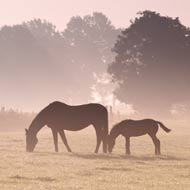Grass sickness 'shares signs with Alzheimer's'

In the UK, around 2 per cent of horses die from EGS every year.
A rare nerve condition of horses may share signs with human brain disorders, a new study has found.
This research offers fresh insight into equine grass sickness (EGS), a rare but largely fatal condition of horses. Edinburgh scientists say their research may help to develop new diagnostic tools.
In the UK, around 2 per cent of horses die from EGS every year. It attacks the nerve cells, causing gastric upset and muscle tremors. Sometimes horses can be nursed back to health if the condition is diagnosed early enough, but more often than not it kills within days.
Researchers from the Roslin Institute and Royal (Dick) School of Veterinary Studies hoped to find out more about the cause of this condition, which is as yet unknown.
When they examined nerve tissue from six horses that died from EGS, they found proteins that are commonly found in the brains of humans with Alzheimer's disease - including amyloid protein.
In total, 506 different proteins were found to be altered in horses with EGS.
Lead author Dr Tom Wishart, from the Roslin Institute, said: "This is the first study to show similarities between an apparently unrelated neurodegenerative disease of large animals and human neurological conditions.
"Although the causes of these conditions are unlikely to be shared, the findings suggest that similar mechanisms could be involved in the later stages of disease."



 The RCVS has announced a new version of its 1CPD mobile app, with enhanced features for veterinary surgeons and veterinary nurses to record their continuing professional development.
The RCVS has announced a new version of its 1CPD mobile app, with enhanced features for veterinary surgeons and veterinary nurses to record their continuing professional development.